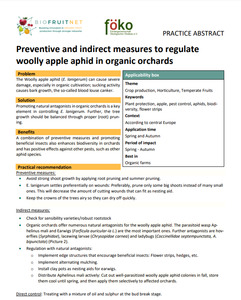{Tool} Preventive and indirect measures to regulate woolly apple aphid in organic orchards (Biofruitnet Practice Abstract). Creator(s): Adolphi, Christina and Oeser, Niklas. Issuing Organisation(s): FÖKO - Fördergemeinschaft Ökologischer Obstbau. Biofruitnet Practice Abstract, no. 051. (2022)
|
PDF
- Published Version
- English
(Preventive and indirect measures to regulate woolly apple aphid in organic orchards)
344kB | |
![[thumbnail of 2022-09-15 11_02_59-Preventive and indirect measures to regulate wool-ly apple aphid in organic orch.png]](/44247/3.hassmallThumbnailVersion/2022-09-15%2011_02_59-Preventive%20and%20indirect%20measures%20to%20regulate%20wool-ly%20apple%20aphid%20in%20organic%20orch.png)  Preview |
Image (PNG)
- Cover Image
- English
117kB |
|
PDF
- Published Version
- German/Deutsch
(Vorbeugende und indirekte Maßnahmen zur Bekämpfung der Blutlaus im ökologischen Obstbau)
344kB |
Document available online at: https://orgprints.org/44247
Summary in the original language of the document
A combination of preventive measures and promoting beneficial insects also enhances biodiversity in orchards and has positive effects against other pests, such as other aphid species.
Practical recommendation
Preventive measures:
• Avoid strong shoot growth by applying root pruning and summer pruning.
• E. lanigerum settles preferentially on wounds: Preferably, prune only some big shoots instead of many small ones. This will decrease the amount of cutting wounds that can fit as nesting aid.
• Keep the crowns of the trees airy so they can dry off quickly.
Indirect measures:
• Check for sensibility varieties/robust rootstock
• Organic orchards offer numerous natural antagonists for the woolly apple aphid. The parasitoid wasp Aphelinus mali and Earwigs (Forficula auricularia L.) are the most important ones. Further antagonists are hoverflies (Syrphidae), lacewing larvae (Chrysopidae carnea) and ladybugs (Coccinellidae septempunctata, A. bipunctata).
• Regulation with natural antagonists:
o Implement edge structures that encourage beneficial insects: Flower strips, hedges, etc.
o Implement alternating mulching.
o Install clay pots as nesting aids for earwigs.
o Distribute Aphelinus mali actively: Cut out well-parasitized woolly apple aphid colonies in fall, store them cool until spring, and then apply them selectively to affected orchards.
Direct control: Treating with a mixture of oil and sulphur at the bud break stage.
| EPrint Type: | Practice tool |
|---|---|
| What problem does the tool address?: | The Woolly apple aphid (E. lanigerum) can cause severe damage, especially in organic cultivation; sucking activity causes bark growth, the so-called blood louse canker. |
| What solution does the tool offer?: | Promoting natural antagonists in organic orchards is a key element in controlling E. lanigerum. Further, the tree growth should be balanced through proper (root) pruning. |
| Country: | Germany |
| Type of Practice Tool: | Practice abstracts |
| Keywords: | Plant protection, apple, pest control, aphids, biodiversity, flower strips, temperate fruits |
| Agrovoc keywords: | Language Value URI English plant protection http://aims.fao.org/aos/agrovoc/c_5978 English apples http://aims.fao.org/aos/agrovoc/c_541 English pest control http://aims.fao.org/aos/agrovoc/c_5726 English Aphididae http://aims.fao.org/aos/agrovoc/c_525 English biodiversity http://aims.fao.org/aos/agrovoc/c_33949 English temperate fruits http://aims.fao.org/aos/agrovoc/c_7655 |
| Subjects: | Crop husbandry > Production systems > Fruit and berries Crop husbandry > Crop health, quality, protection |
| Research affiliation: | European Union > Horizon 2020 > Biofruitnet Germany > Fördergemeinschaft Ökologischer Obstbau - FÖKO European Union > Organic Farm Knowledge |
| Horizon Europe or H2020 Grant Agreement Number: | 862850 |
| Related Links: | https://organic-farmknowledge.org/tool/44247, https://biofruitnet.eu |
| Project ID: | ofk |
| Deposited By: | Basler, Andreas |
| ID Code: | 44247 |
| Deposited On: | 05 Jul 2022 08:04 |
| Last Modified: | 02 May 2024 10:31 |
| Document Language: | English, German/Deutsch |
| Status: | Published |
Repository Staff Only: item control page

 Download Statistics
Download Statistics Download Statistics
Download Statistics
